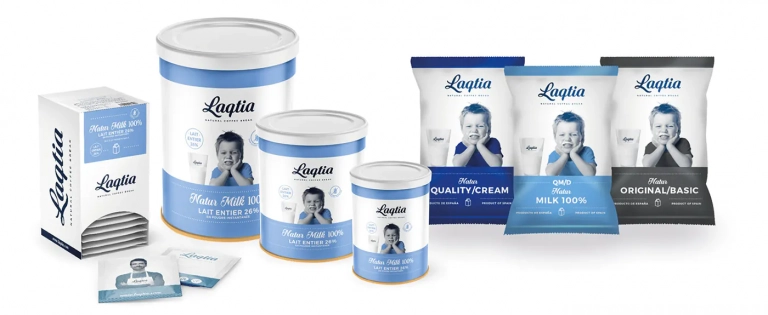Not all powdered or granulated milk are and work the same way, nor do all behave the same way in vending machines. The difference between one and the other is based mainly on three aspects: the raw material, the manufacturing process and the granulometry.
Milk raw materials for vending machines
When choosing powdered (Or rather granulated) milk for your vending machines, you should look at the origin of the raw material of which has been manufactured. Powdered milk for vending machines is still liquid milk from which the water has been removed, so the origin of the cattle will be what indicates its quality.
At Laqtia, for example, all our milk for vending machines comes from Western European cattle which, upon arrival at our factory, are analyzed by the quality department and treated following the strictest safety measures.
The milk manufacturing process for vending machines
To ensure that the milk served by your vending machines is excellent, the manufacturing process must also be.
Milky products for vending machines are manufactured using milk, lactose and whey. But if they are mixed directly, the final product would be very purulent and would not last in the machines. For this reason, at Laqtia we use steam injectors to carry out the initial mixture, which results in a wet product that then passes to a drying funnel where it is treated at 90 degrees to form the dry granules before continuing with the process – which is different in depending on whether it is whole milk, skimmed milk or milk-based preparations, and whether or not sugar is added. You must bear in mind that 1 Kilo of milk for vending is equivalent to 10 liters of liquid milk.
Another characteristic to take into consideration in the manufacture process of milk for vending machines is food safety. Check before choosing the product what kind of safety measures and standards are applied in the process, both to the raw material and to the factory machinery, since all of this will affect the quality of the milk that your customer will enjoy final.
Never choose milk for your vending machines from brands that do not test for staphylococci (whose presence indicates an inadequate milking process and low hygienic and sanitary quality), listeria or salmonella, that do not analyze the surfaces of their machinery in a periodically or that do not include the microbiological analysis carried out on the product in each batch.
Volume and stable granule
There are two fundamental factors that you have to take into account to choose the best milk for your vending machines: the granule size and the volume. If both are stable, the vending machine will work correctly without any problems such as the mixer getting stuck, the quantity dispensed being less than desired, or the final quality of the milk that the customer drinks not being optimal. .
The volume and final granules of milk for vending machines depend on the way the grain is broken in the manufacturing process. At Laqtia, for example, we use mobile filters that sift the product until it reaches the perfect granulometry. You must bear in mind; again, that 1 Kilo of milk for vending is equivalent to 10 liters of liquid milk.
Summing up; before choosing powdered milk for your vending machines, make sure that the manufacturer brand takes care of the entire manufacturing chain in detail: from the selection of raw materials to final delivery. In this way you will have the security of offering your customers the best quality vending milk.


